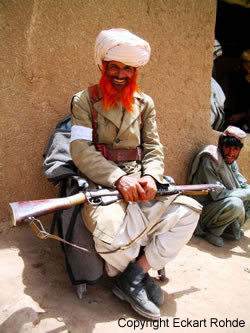By Rod Nordland

An Arbaki member in Ghazni province 2005. (Photo: Eckart Rohde)
KABUL – Arbakai militias are a growing feature of life in northern Afghanistan, and many of them are actually former Taliban insurgents who have declared for the government side. So if they levy taxes on local villagers and beat up people they do not get along with, at least they’re not fighting on the side of the enemy, right?
Or wrong? Untrained local forces like the arbakai, who hope to be accepted and paid as Afghan Local Police, “just create problems,” an international official with knowledge of the A.L.P. program said. “It is still preying on the people, changing one predator for another.”
And that comes from one of their supporters.
Local people in Kunduz Province and elsewhere in northern Afghanistan are furious about the excesses of the arbakai, and it is giving the A.L.P. training program a bad name. In one case cited by the head of the provincial education department, two arbakai commanders and their fighters beat the head master and his assistant at a girl’s school in Kunduz City because they refused to pay a tithe.
And reports have emerged that arbakai may be behind a gang rape of a 12-year-old girl that has galvanized residents in Taluqan, the capital of Takhar Province, just east of Kunduz Province. Although authorities are still investigating the case, militias have emerged as the prime suspects — a clear indication of how unpopular they have become.
In Imam Sahib district in Kunduz, much of which used to be Taliban controlled and now is mostly in either government or, more commonly, arbakai hands, the badly staffed district government has only one of the three judges it should have. The vacuum is filled by, guess what? Self-appointed arbakai courts.
An Afghan employee of The New York Times in Kunduz contributed reporting.



